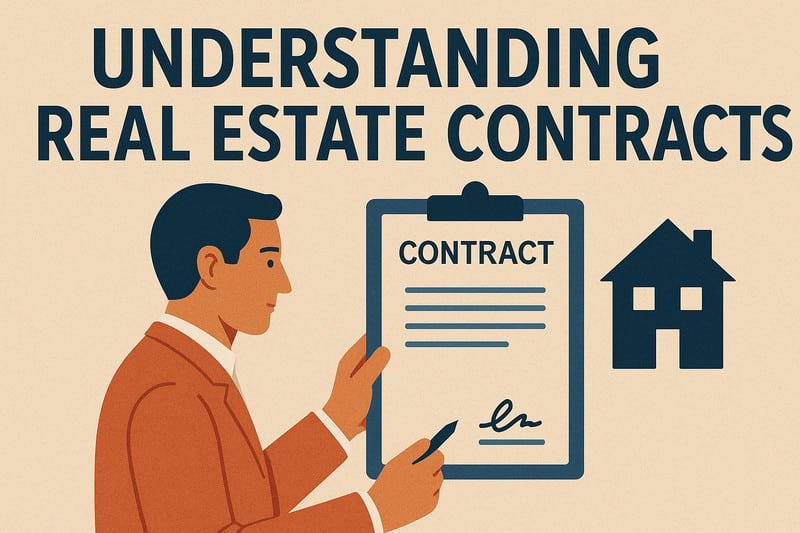
Curious what could make or break your property deal?
Real estate contracts can be complex. Dense legal jargon, confusing clauses, and terms which leave most buyers and sellers bewildered. But here’s the problem…
One misunderstood clause can cost you thousands of dollars.
With 4 million existing home transactions in 2024 alone, that’s millions of contracts being signed every year. And most buyers and sellers have no idea what they are actually agreeing to.
The truth is, understanding your real estate contract isn’t just important — it’s absolutely critical to protecting your investment.
Let’s break down exactly what you need to know.
What you’ll discover:
- What Makes Real Estate Contracts Legally Binding?
- The 7 Most Important Contract Clauses You Need to Know
- How to Avoid Common Contract Pitfalls
- When You Should Walk Away From a Deal
What Makes Real Estate Contracts Legally Binding?
Real estate contracts are more than just pieces of paper.
They are legal agreements that both parties must perform to complete the sale. So when you work with expert real estate agency services, you’ll want to be sure every detail is handled correctly.
That’s where real estate professionals like The Geelong Agency Property Management come in and guide you through all the contract clauses.
And here’s what makes a real estate contract legally enforceable:
- Offer and acceptance — One party makes an offer, the other accepts it
- Consideration — Something of value is exchanged (money for property, usually)
- Legal capacity — All parties have the legal ability to enter the contract
- Legal purpose — The contract must be for something lawful
But that’s just the basics…
The real power (and danger) is in the specific clauses buried in the contract. These clauses define who pays for what, when the sale happens, and what happens if something goes wrong.
The 7 Most Important Contract Clauses You Need to Know
Walk me through the clauses that matter most. These are the ones that can save or cost you serious money…
Purchase Price and Payment Terms
This one seems obvious, right?
Not quite. The purchase price clause doesn’t just state how much you’re paying — it outlines exactly how and when you’ll pay it.
This includes down payment amount, financing contingencies, earnest money requirements, and closing costs.
Here’s why this matters: If you can’t secure financing by the deadline, you could lose your earnest money deposit.
That’s often thousands of dollars down the drain.
Inspection Contingency
What clause protects you from buying a money pit?
The inspection contingency gives you the right to have the property professionally inspected. More importantly, it gives you the right to walk away or negotiate repairs based on what the inspector finds.
Without this clause, you’re buying the property “as-is.”
Financing Contingency
This is your safety net if you can’t get a mortgage.
It states that the sale is contingent on you securing financing by a specific date. If your loan falls through, you can cancel the contract and get your earnest money back.
But here’s the catch… You must make a good faith effort to secure financing.
Title Contingency
Think you’re buying a house with a clean title? Think again.
The title contingency protects you if problems are discovered with the property’s ownership history. This includes outstanding liens, ownership disputes, easement problems, and unpaid taxes.
Without this protection, you could end up fighting legal battles to actually own the property you just bought.
Appraisal Contingency
Here’s a clause that’s become incredibly important in today’s market…
The appraisal contingency protects you if the property appraises for less than the purchase price.
If the appraisal comes in low, you can negotiate a lower price, pay the difference in cash, or walk away from the deal.
Repair and Maintenance Clause
Who’s responsible for keeping the property in good condition until closing?
This clause specifies that the seller must maintain the property in its current condition until you take ownership. If something major breaks, the seller has to fix it.
Closing Date and Possession
When do you actually get the keys?
The closing date clause sets the deadline for completing the sale and specifies when you get possession. Sometimes these are different dates.
Here’s what can go wrong: Sellers sometimes ask to stay after closing, creating potential problems if they damage the property or refuse to leave.
Common Contract Pitfalls to Avoid
Real estate contracts are full of traps for the unwary. Here are the mistakes that cost people the most money…
Waiving Important Contingencies
In competitive markets, buyers often waive contingencies to make their offers more attractive. This is incredibly risky.
Never waive these contingencies:
- Inspection contingency (you could buy a house with major problems)
- Financing contingency (you could lose your earnest money)
- Appraisal contingency (you could overpay significantly)
Ignoring the Fine Print
Most people focus on the big numbers and ignore everything else. Big mistake.
The fine print contains crucial details about deadlines, responsibilities, and penalties. Missing a deadline can be expensive.
Not Understanding Default Consequences
What happens if you or the seller can’t complete the sale?
The default clause explains the consequences of breach of contract. This could include forfeiting your earnest money, paying legal fees, or being sued for specific performance.
Red Flags That Should Make You Walk Away
Sometimes the best deal is the one you don’t make. Here are warning signs that you should seriously consider walking away…
Seller Refuses Standard Contingencies
If a seller won’t agree to basic buyer protections, ask yourself why.
Are they hiding something about the property?
Are they in such a hurry to sell that they’re willing to lose buyers over reasonable contingencies?
Either way, it’s not a good sign.
Unreasonable Deadlines
Some sellers try to rush buyers with tight deadlines.
This prevents proper due diligence.
You should have adequate time for inspections, mortgage processing, title searches, and review.
Contract Contains Unusual Clauses
Standard real estate contracts exist for a reason.
If the seller insists on unusual clauses or terms, get them reviewed by a real estate attorney.
Custom clauses often benefit one party at the expense of the other.
The Bottom Line
Real estate contracts aren’t just paperwork — they’re the foundation of one of the biggest financial transactions of your life.
Understanding these clauses can save you thousands of dollars and endless headaches.
Don’t go it alone.
Work with experienced professionals who understand contract law and can spot potential problems before they become expensive mistakes.
Remember: 82% of homeowners currently have mortgage rates below 6%, which means most people haven’t dealt with contracts in years.
Don’t let inexperience cost you.
Take time to understand what you’re signing. Get expert help.
Your future self will thank you.








